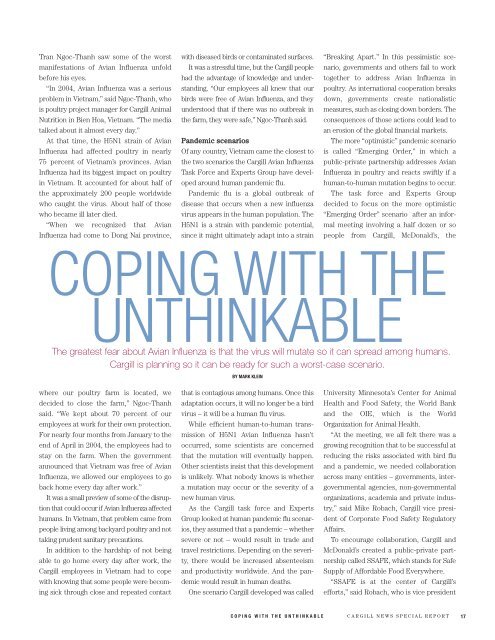Cargill Special Report - Cargill Meat Solutions
Cargill Special Report - Cargill Meat Solutions
Cargill Special Report - Cargill Meat Solutions
Create successful ePaper yourself
Turn your PDF publications into a flip-book with our unique Google optimized e-Paper software.
Tran Ngoc-Thanh saw some of the worst<br />
manifestations of Avian Influenza unfold<br />
before his eyes.<br />
“In 2004, Avian Influenza was a serious<br />
problem in Vietnam,” said Ngoc-Thanh, who<br />
is poultry project manager for <strong>Cargill</strong> Animal<br />
Nutrition in Bien Hoa, Vietnam. “The media<br />
talked about it almost every day.”<br />
At that time, the H5N1 strain of Avian<br />
Influenza had affected poultry in nearly<br />
75 percent of Vietnam’s provinces. Avian<br />
Influenza had its biggest impact on poultry<br />
in Vietnam. It accounted for about half of<br />
the approximately 200 people worldwide<br />
who caught the virus. About half of those<br />
who became ill later died.<br />
“When we recognized that Avian<br />
Influenza had come to Dong Nai province,<br />
where our poultry farm is located, we<br />
decided to close the farm,” Ngoc-Thanh<br />
said. “We kept about 70 percent of our<br />
employees at work for their own protection.<br />
For nearly four months from January to the<br />
end of April in 2004, the employees had to<br />
stay on the farm. When the government<br />
announced that Vietnam was free of Avian<br />
Influenza, we allowed our employees to go<br />
back home every day after work.”<br />
It was a small preview of some of the disruption<br />
that could occur if Avian Influenza affected<br />
humans. In Vietnam, that problem came from<br />
people living among backyard poultry and not<br />
taking prudent sanitary precautions.<br />
In addition to the hardship of not being<br />
able to go home every day after work, the<br />
<strong>Cargill</strong> employees in Vietnam had to cope<br />
with knowing that some people were becoming<br />
sick through close and repeated contact<br />
with diseased birds or contaminated surfaces.<br />
It was a stressful time, but the <strong>Cargill</strong> people<br />
had the advantage of knowledge and understanding.<br />
“Our employees all knew that our<br />
birds were free of Avian Influenza, and they<br />
understood that if there was no outbreak in<br />
the farm, they were safe,” Ngoc-Thanh said.<br />
Pandemic scenarios<br />
Of any country, Vietnam came the closest to<br />
the two scenarios the <strong>Cargill</strong> Avian Influenza<br />
Task Force and Experts Group have developed<br />
around human pandemic flu.<br />
Pandemic flu is a global outbreak of<br />
disease that occurs when a new influenza<br />
virus appears in the human population. The<br />
H5N1 is a strain with pandemic potential,<br />
since it might ultimately adapt into a strain<br />
that is contagious among humans. Once this<br />
adaptation occurs, it will no longer be a bird<br />
virus – it will be a human flu virus.<br />
While efficient human-to-human transmission<br />
of H5N1 Avian Influenza hasn’t<br />
occurred, some scientists are concerned<br />
that the mutation will eventually happen.<br />
Other scientists insist that this development<br />
is unlikely. What nobody knows is whether<br />
a mutation may occur or the severity of a<br />
new human virus.<br />
As the <strong>Cargill</strong> task force and Experts<br />
Group looked at human pandemic flu scenarios,<br />
they assumed that a pandemic – whether<br />
severe or not – would result in trade and<br />
travel restrictions. Depending on the severity,<br />
there would be increased absenteeism<br />
and productivity worldwide. And the pandemic<br />
would result in human deaths.<br />
One scenario <strong>Cargill</strong> developed was called<br />
“Breaking Apart.” In this pessimistic scenario,<br />
governments and others fail to work<br />
together to address Avian Influenza in<br />
poultry. As international cooperation breaks<br />
down, governments create nationalistic<br />
measures, such as closing down borders. The<br />
consequences of those actions could lead to<br />
an erosion of the global financial markets.<br />
The more “optimistic” pandemic scenario<br />
is called “Emerging Order,” in which a<br />
public-private partnership addresses Avian<br />
Influenza in poultry and reacts swiftly if a<br />
human-to-human mutation begins to occur.<br />
The task force and Experts Group<br />
decided to focus on the more optimistic<br />
“Emerging Order” scenario after an informal<br />
meeting involving a half dozen or so<br />
people from <strong>Cargill</strong>, McDonald’s, the<br />
COPING WITH THE<br />
UNTHINKABLE<br />
The greatest fear about Avian Influenza is that the virus will mutate so it can spread among humans.<br />
<strong>Cargill</strong> is planning so it can be ready for such a worst-case scenario.<br />
BY MARK KLEIN<br />
COPING WITH THE UNTHINKABLE<br />
University Minnesota’s Center for Animal<br />
Health and Food Safety, the World Bank<br />
and the OIE, which is the World<br />
Organization for Animal Health.<br />
“At the meeting, we all felt there was a<br />
growing recognition that to be successful at<br />
reducing the risks associated with bird flu<br />
and a pandemic, we needed collaboration<br />
across many entities – governments, intergovernmental<br />
agencies, non-governmental<br />
organizations, academia and private industry,”<br />
said Mike Robach, <strong>Cargill</strong> vice president<br />
of Corporate Food Safety Regulatory<br />
Affairs.<br />
To encourage collaboration, <strong>Cargill</strong> and<br />
McDonald’s created a public-private partnership<br />
called SSAFE, which stands for Safe<br />
Supply of Affordable Food Everywhere.<br />
“SSAFE is at the center of <strong>Cargill</strong>’s<br />
efforts,” said Robach, who is vice president<br />
CARGILL NEWS SPECIAL REPORT<br />
17


